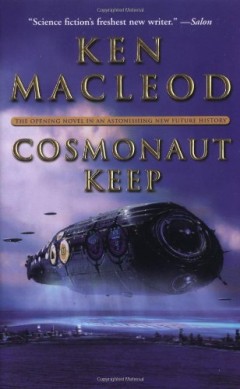
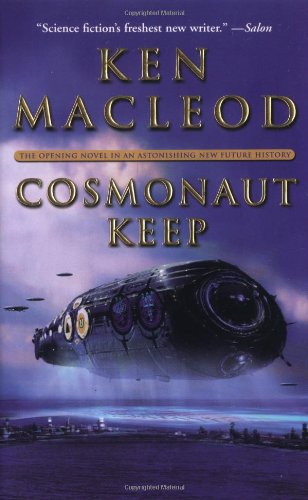
Cosmonaut Keep is the first book of the Engines of Light trilogy by Ken MacLeod, combining space opera with a unique take on the ufo mythos and a variety of leftist and libertarian political perspectives. It is told in two widely different alternating timelines, both focusing on the dream of interstellar travel.
The first timeline is set in a near-future Edinburgh, in a world where a neo–Soviet Russia has beaten back the United States and installed a kinder, gentler socialism in Europe. Matt Cairns is a computer programmer, and a member of the International Workers of the World Wide Web (or Webblies). He stumbles upon a group of American libertarians trying to overthrow the Party for fun and profit, and ends up carrying a mysterious data disk containing what appear to be plans for light-speed travel and an antigravity spaceship. Meanwhile, a rebellious European space station claims to have made first contact with aliens within an asteroid.
The second timeline is set on Mingulay, a planet in the Second Sphere, an ancient multispecies civilization. The two oldest species are the krakens and the saurs, both millions of years old. The krakens (bioluminescent and intelligent giant squid) navigate the lightspeed starships that ply the Second Sphere, while the saurs (secretive beings descended from bipedal dinosaurs who look suspiciously like the Greys of ufology) pilot gravity skiffs (read: flying saucers). In addition to two other species of hominid, there are also humans descended from those abducted from Earth by the saurs and taken to the Second Sphere over the millenia. Above all are the gods, superintelligent communities of extremophile bacteria who live in comets and asteroids, whose one and only commandment is “Leave us alone!” In this timeline, we follow Gregor Cairns — a member of the Cosmonaut Families, the descendents of the crew of a human-piloted starship from Earth — whose family has been working secretly on an interstellar navigation problem for two hundred years.
[continue reading…]
Help Promote Prometheus Unbound by Sharing this Post
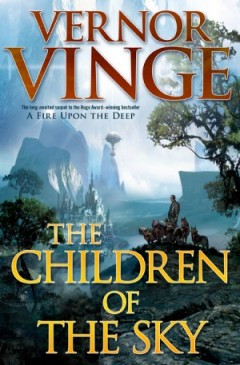
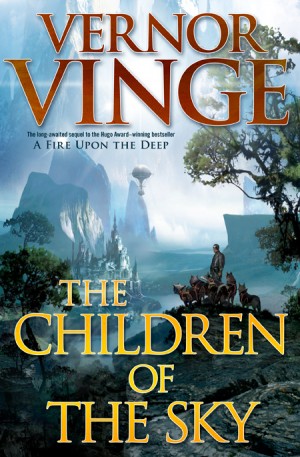
The Children of the Sky is the long-anticipated sequel to the Vernor Vinge’s Hugo Award–winning A Fire Upon The Deep. It is set in his Zones of Thought universe, which imagines a galaxy divided into regions that support different levels of technology and intelligence, from the easy FTL travel and posthuman Powers of the Transcend to the appropriately named Unthinking Depths at the galactic core.
The first time I read this book, I didn’t like it. I, like many others, was expecting a fast-paced adventure spanning the galaxy, such as A Fire Upon The Deep. Instead, the setting is limited to Tine’s World. I was looking for a satisfying resolution to the menace of the approaching Blight fleet, but the ahuman superintelligence stays comfortably in the background. I almost didn’t give it a second chance, but I did, and I appreciated it more the second time through. Once I got past the fact that this book was not what I was expecting, I enjoyed it, although it isn’t on the same level as A Fire Upon The Deep or A Deepness In The Sky.
The story starts 10 years after the ending of the previous book. Ravna Bergsndot leads the awakened Children, refugees from the Blight’s destruction of their home and stranded on Tine’s World. They are attempting to build a technological civilization capable of repelling the Blight with the help of the Out of Band II, the partially-functional starship that originally carried Ravna and the frozen Children to Tine’s World, and the Tines, a fascinating alien species made up of packs of 4 to 8 wolf-like creatures that act as a single individual.
Ravna and the Children have the support of Woodcarver, the ruler of an emerging empire. However, many of the Children are suspicious of Ravna’s interpretation of the Blight and the destruction of their home world, and in the far-off Tropics, a pack named Tycoon is starting an industrial revolution, assisted by Vendacious, Woodcarver’s traitorous spymaster.
[continue reading…]
Help Promote Prometheus Unbound by Sharing this Post
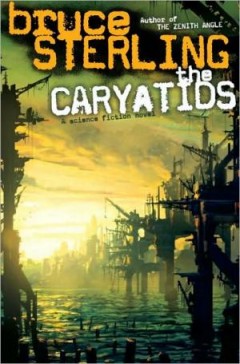
The Caryatids is the latest novel by Bruce Sterling, one of the founders of cyberpunk. True to his style, every page explodes with new ideas on technology, and its social and political effects.
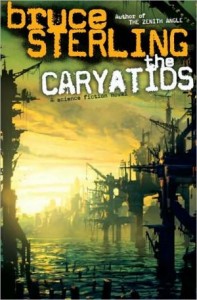 One of the central themes of the book is catastrophic climate change. This is surely controversial among libertarians, but what is interesting from a libertarian perspective is how this idea is handled. Traditional nation-states, with the lone exception of China, collapsed during the climate crisis. In their place, two “global civil societies” emerged: the Dispensation, a flashy entrepreneurial capitalist society, and the Acquis, a global collective that is focused on rebuilding Earth’s shattered ecosystems. The relationship between the two is very complex; war is generally held to be obsolete, replaced by constant economic competition and espionage. However, both groups also cooperate on a number of projects. The state of China remains, although at the expense of millions of its own citizens. All three groups fully embrace high technology to try to rebuild the world, each in their own way.
One of the central themes of the book is catastrophic climate change. This is surely controversial among libertarians, but what is interesting from a libertarian perspective is how this idea is handled. Traditional nation-states, with the lone exception of China, collapsed during the climate crisis. In their place, two “global civil societies” emerged: the Dispensation, a flashy entrepreneurial capitalist society, and the Acquis, a global collective that is focused on rebuilding Earth’s shattered ecosystems. The relationship between the two is very complex; war is generally held to be obsolete, replaced by constant economic competition and espionage. However, both groups also cooperate on a number of projects. The state of China remains, although at the expense of millions of its own citizens. All three groups fully embrace high technology to try to rebuild the world, each in their own way.
[continue reading…]
Help Promote Prometheus Unbound by Sharing this Post














